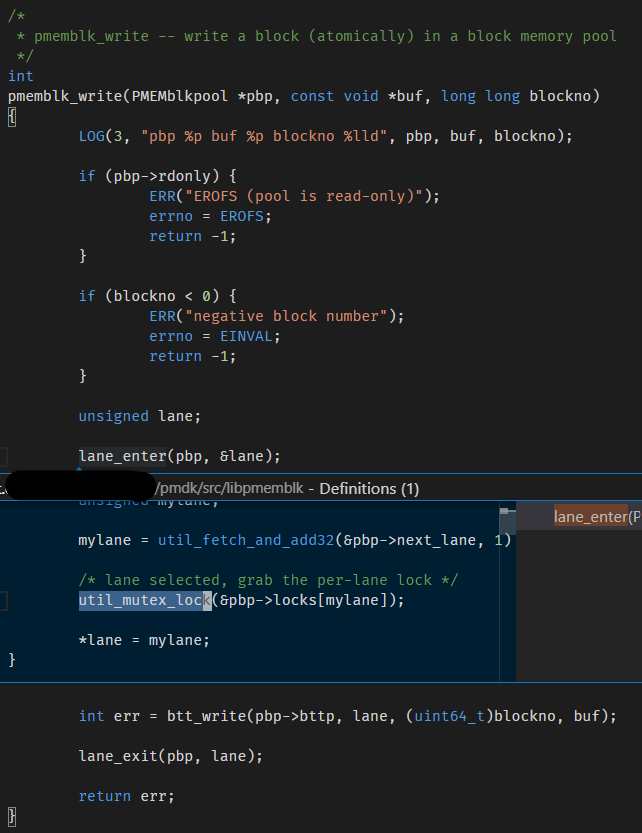- Ceph Crimson OSD
- Utilize
- fast networking devices & storage devices
- multi-core
- modern techniques
- Goals
- bypass kernel
- avoid memcpy
- avoid lock contention
- Utilize
- Ceph SeaStore
Modern Technologies
SeaStar
A C++ asynchronous programming framework.
- user space task scheduler
- no context switch to minimize system CPU acquisition
Ceph’s crimson-osd use SeaStar to simplify asynchronous development, and to relieve CPU from
if-elses.
Data Plane Development Kit (DPDK)
Provide a simple, complete framework for fast packet processing in data plane applications.
- polling-mode
Used as PCIe driver (environment) in SPDK, for MMIO (Memory-Mapped I/O), PCI BAR (Base Address Register), thus enabling NVMe CMB (Controller Memory Buffer) and achieving zero-copy, that kind of stuff.
Storage Performance Development Kit (SPDK)
The bedrock of SPDK is a user space, polled-mode, asynchronous, lockless NVMe driver.
- user space: no context switch, minimize CPU usage
- applications issue NVMe commands to device directly
- polled-mode: minimize latency & latency jitter
- it will fully acquire the assigned CPU
-
interrupt-mode is enabled by hardware, effectively involve kernel
IO_URING
- NVMe (DDIO) ensures polling only checks host memory (cache)
- asynchronous
-
runtimes (reactors) are pinned to specific CPU cores
If a request were not initially polled by the corresponding CPU / thread of the bounded NVMe queue pair (aka the owning thread), it is preferred that the request is forwarded to the correct thread via message passing mechenism, as opposed to introduce locking.
-
coroutines (
spdk_threads) are scheduled by SPDK or a user-specified runtime (environment), instead of the operating systemThe default
staticscheduler just round-robin around reactors (on their designated core), polling for events.
-
- lockless: ring buffer with CaS
Blobstore
For “blob” (or object) storage.
include/spdk/blob.hlib/blob/
Device Abstraction
| Abstraction (low-high) | Size | Function |
|---|---|---|
| Logical block | 256B / 4KiB | Device physical block |
| Page (aka Extent) | 4KiB | Device atomic op |
| Cluster | Configurable (default 1MiB) | Object size |
| Blob | Multitude of clusters | Logical object |
| Blobstore |
| Op | Atomicity |
|---|---|
| Data writes | Guaranteed |
| Blob metadata update | Manual* / On-offload |
| Blobstore metadata update | On-offload** |
*
spdk_blob_sync_md()** If not shutdown properly, it will take some time for the Blobstore to fully boot up, but consistency is still guaranteed.
Metadata
Stored in memory during runtime.
To avoid locking, a separate (SPDK-)thread is used to handle requests on metadata. However, it’s the caller’s responsibility not to mix up metadata requests with each other and with regular I/O requests.
Block Device Layer
A single generic library lib/bdev, plus a number of optional modules that
implements various types of block devices (equivalent to device driver in a
traditional operating system).
- Bdev
include/spdk/bdev.hlib/bdev/
- Bdev module
include/spdk/bdev_module.hmodule/bdev/
Bdevs can be layered! Bdevs that route I/O to other bdevs are often referred to as virtual bdevs (or vbdevs).
Fun fact, The
pmemmodule internally useslibpmemblkfrom PMDK. Who said anything about user space, lockless and no context switching?
Acceleration Framework
Intel I/O Acceleration Technology (I/OAT)
… I/OAT allows offloading data movement to dedicated hardware within the platform, recalim CPU cycles that would otherwise be spent on tasks like
memcpy… Intel I/OAT can take advantage of PCI-Express nontransparent-bridging, which allows movement of memory blocks between two different PCIe connected motherboards, thus effectively allowing the movement of data between two different computers at nearly the same speed as moving data in memory of a single computer…
Intel Data Streaming Accelerator (DSA)
Persistent Memory Development Kit (PMDK)
A collection of libraries for common use cases of SCM.
- libpmem(2): low-level
- libpmemobj: transactional object store
- libpmemobj++: STL-like programming model
- libpmemkv: key in DRAM, value in PMEM
- libpmemblk: atomically updated block / memory file
- libpmemlog: persistent log file
- libpmemcache: use DRAM as LRU cache of PMEM
- libpmemkind: DRAM as fast tier, PMEM as capatity tier
Source
Based on tag v16.2.5 (@ 0883bdea7337b95e4b611c768c0279868462204a).
HAVE_BLUESTORE_PMEMCompile Flag- pmem used as
mmap()-ed file
- pmem used as
AllocatortypeBlueStore::shared_allocdefaults to"block"(seesrc/os/bluestore/BlueStore.cc/BlueStore::_create_alloc())
For all Ceph config options, see
src/common/options.cc/get_global_options().
Readings
- [SDC’16] Challenges in Using Persistent Memory in Distributed Storage Systems
- High performance network (RDMA) and fast storage devices (SCM) only helps
with large I/Os, not small
- LOOKUP RTT dominates faster data transfer
- Considering streamline, coalescing protocal, shrinking stack etc.
- High performance network (RDMA) and fast storage devices (SCM) only helps
with large I/Os, not small
